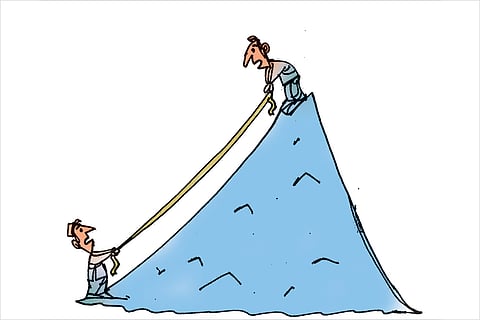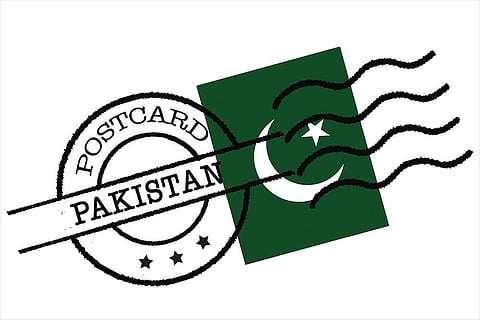The Mythological Method
The Subcontinental Menu
Meteorology is a passe, only divine intervention is the way out in MP; while it now takes only six minutes for a newborn's Aadhar in Maharashtra. Read all the juicy gossip from the neighbourhood...
Farmers in Madhya Pradesh have brought divine retribution upon themselves. So goes the explanation offered by state minister Paras Chandra Jain for the dry spell in certain regions. The farmers poured milk on the roads during a recent protest and, as Jain explains, “Milk is offered to Hindu gods and hence is considered sacred.… Bad monsoon is a manifestation of their [the gods’] displeasure.” The theory failed to impress many, but one of Jain’s aides came up with a more scientific account: “Deity Ganga finds her abode over Lord Shiva’s head. Hence, she will be affected, causing a scarcity of water if Lord Shiva, who loves to take a bath in milk, gets angry.” The aide has asked party workers to promote this theory among the people, saying “Mythology can be manouevred confidently, because no God will issue a denial.”

Identified And Processed: Six Minutes For Newborn’s Aadhaar
At three minutes past noon on September 24, at the Osmanabad district women’s hospital in Maharashtra, the child who would be named Bhavna Santosh Jadhav was born. At nine minutes past noon on September 24, the parents, who had already enrolled her with the Unique Identification Authority of India (UIAI) received her birth certificate and Aadhaar number online. District Collector Radhakrushna Game considers this a “proud moment for Osmanabad”, and adds, “We will soon register all children for Aadhaar and link their numbers with those of their parents.” According to Eknath Male, the hospital’s chief civil surgeon, almost 1,300 children who were born there over the past year have received their Aadhaar numbers.

Does Everest Measure Up? Nepal To Find Out
In 2015, Nepal was rocked by a devastating earthquake. The Himalayan nation’s Department of Survey is now concerned by reports that the world’s highest peak was affected, altering its proud height. The department is preparing for action. Its deputy director-general, Neeraj Manandhar, says, “The Department of Survey...will re-measure the height of Mt Everest. There are reports that changes are noticed in its height due to the earthquakes.” There are pre-existing disputes over the peak’s exact height. The Survey of India measured it in 1955 as 8,848m, and this is the current official height according to China and Nepal. However, Nepal has agreed, following some contention, to recognise the “rock height” (as opposed to the “snow height”) as being 8843m, as per the results of a 2005 Chinese survey.

A Thousand (And Eight) Golden Names
Gold coins numbering 1008, one for each of the deity’s 1008 names and strung together in a garland, weighing approximately 28 kg and worth Rs 8.36 crore, were offered to Lord Venkateshwara at the hill temple in Tirumala by M. Ramalinga Raju as the yearly Brahmotsavam commenced on September 23. Andhra Pradesh Chief Minister N. Chandrababu Naidu was among the onlookers as the devotee, an entrepreneur from Vijayawada, handed over the ‘sahasra nama mala’ to the priests and governing officials of the shrine. The CM had come to make the state government’s customary presentation of a set of new silk clothes to the god at the beginning of the festival, which will go on for nine days.

Compensation For Shaken Commuter
The Railways dismissed his complaint as being “false and frivolous”. But Raman Dutt, a regular commuter to Delhi from Jalandhar on the Shatabdi Express, has succeeded in his litigation over an excruciating train journey. Dutt recalls the incident on February 17, 2015: “During the journey, severe jerks resulted in water spilling on my clothes, and I also suffered pain in the neck and the lower back.” Later, he was diagnosed with cervical spondylosis. He then decided to move the District Consumer Disputes Redressal Forum, which has now ordered the Railways to refund his ticket and pay him Rs 20,000 as compensation.
Assamese Redefined
“A language related to Bengali which is spoken...in Assam and...in Bangladesh.” This definition of ‘Assamese’ in the Oxford English Dictionary led Partha Pratim Hazarika of the The Assam Tribune to file a petition online to change it. The Tribune also sent an e-mail to OUP’s editorial team, which resulted in the definition being reviewed and changed. The new definition, then: “An Indic language spoken mainly in Assam”. Assamese has around 15 million speakers and only a few of those are found in Bangladesh, rather than half, as the old definition claimed.
Law Supplements Love
PRANAM. No, it’s not just a salutation. It is now a tortured acronym for the Assam Employees Parents Responsibility and Norms for Accountability and Monitoring Bill, 2017. The bill was passed into law in the Assam Assembly recently. It will place a legal requirement on state government employees to provide for any dependent parents and differently abled siblings. If any employee violates its provisions, 15 per cent of their salary will be deducted and deposited in the bank accounts of the parents/siblings who registered the complaint. The law’s roots lie in statistics showing that number of neglected elderly parents was on the rise, a situation that the state government hopes to change.

A Straight Bat For Asif
Under pressure from various quarters, including many of its close allies, for its close links with terror groups, Pakistan has finally admitted that the Haqqanis and the Lashkar-e-Toiba are “liabilities.”
“It is very easy to say Pakistan is floating the Haqqanis and Hafiz Saeed and Lashkar-e-Toiba,” Pakistan’s foreign minister Khwaja Asif said at the Asia Society in New York. He added, “They are liabilities. I accept that they are liabilities, but give us time to get rid of them because we don’t have the assets to match these liabilities and you are increasing them (our liabilities).”
Asif is in New York for the current session of the United Nations General Assembly. He made the remarks at an interaction with, and address to, think-tank members and opinion-makers at the Asia Society.
Asif initially attempted to strike a defiant note, as he tried to make it clear that though the blame was now on Pakistan, till a few decades back these terror outfits were feted by the then United States administration. “These terrorists were considered the ‘darlings’ of the White House until a few decades ago,” he said.
In a candid statement, Asif pointed out, “Don’t blame us for the Haqqanis and don’t blame us for the Hafiz Saeeds. These were the people who were your darlings just 20 to 30 years back. They were being dined and wined in the White House and now you say ‘go to hell Pakistan because you are nurturing these people’.”
But if Asif’s remarks reflected the rising nervousness of Pakistan following the US’s public castigation of it for allowing terror groups to operate from its soil, it also showed a correct assessment of Washington’s core concern: stabilising Afghanistan to enable them to withdraw their soldiers from the war-torn country at the earliest. However, that Washington is equally concerned about Pakistan’s terror activities in Kashmir and elsewhere in India is still a matter of conjecture.
“We are mindful of the strong desire in the US to bring the ‘long war’ in Afghanistan to an end,” the minister said. But he was quick to point out that the situation in the region will not improve unless Pakistan’s relations with India improved. Seeking US intervention, he said new initiatives were needed to bring India and Pakistan to the talks table. This can well be the opening that Trump is looking for, as on past occasions he has expressed his desire to bring the two hostile South Asian neighbours to a dialogue.
Illustrations by Sajith Kumar
Tags